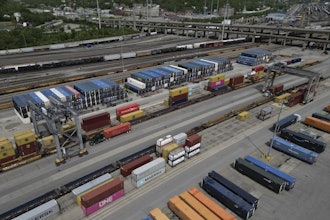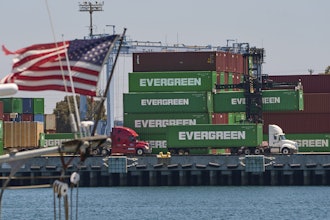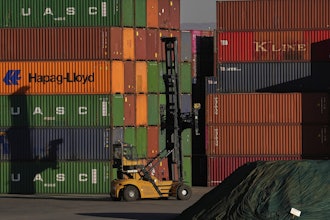
LONDON (AP) — British lawmakers look set to put the brakes on Brexit — for now.
Parliament is due to vote Thursday on whether to ask the European Union to delay the U.K.'s exit, due in just over two weeks on March 29.
It comes a day after lawmakers committed the country to staying in the bloc unless a divorce deal is ratified. With the approaching deadline intensifying fears that economic turmoil might follow a "no-deal" withdrawal by Britain, Parliament voted 321-278 Wednesday to rule out the possibility.
However, Prime Minister Theresa May and the European Union noted the decision wasn't legally binding. She still hopes to get the House of Commons to pass her divorce deal despite two big defeats.
A look at what might happen next:
___
DELAY, DELAY, DELAY
After a series of Parliamentary defeats, May has grudgingly given lawmakers a vote on delaying Brexit. This option is likely to prove popular, since politicians on both sides of the Brexit debate fear time is running out to secure an orderly withdrawal by March 29.
But how long an extension, and for what purpose, are unclear.
May is proposing an extension until June 30 — but only if she can get Parliament to back her Brexit deal at a third attempt by March 20.
If it is defeated again, May says Britain will have to seek a long extension — with the risk that opponents of Brexit will use that time to soften the terms of departure or even overturn the decision to leave.
An extension requires approval from all 27 remaining EU member countries. They have an opportunity to grant such a request at a March 21-22 summit in Brussels.
But the rest of the EU is reluctant to postpone Brexit beyond the late May elections for the EU's legislature. The U.K. won't be represented in the European Parliament after it quits the EU; its seats already have been given to other countries to fill in the elections.
The bloc is more open to a long delay to allow Britain to radically change course. European Council President Donald Tusk tweeted Thursday he will appeal to the leaders of the other 27 EU nations "to be open to a long extension if the U.K. finds it necessary to rethink its Brexit strategy and build consensus about it."
___
CONTINUING CRISIS
Whatever Parliament decides this week, it won't end Britain's Brexit crisis. Both lawmakers and the public remain split between backers of a clean break from the EU and those who favor continuing a close relationship, either through a post-Brexit trade deal or by reversing the June 2016 decision to leave.
May also appears to be unwilling to abandon her hard-won deal with the EU on Britain's withdrawal and future relationship with the bloc. Parliament voted it down twice, and May looks set to put it to a third vote next week.
Her Conservative government is holding talks with its Northern Irish political allies and pro-Brexit backbench lawmakers to see if they will abandon opposition to the deal. Their concerns center on a guarantee in the exit deal to maintain an open Irish border after Brexit. The border "backstop" would keep the U.K. tied to EU trade rules, and Brexiteers worry it could trap the country in lockstep with the bloc indefinitely.
The government has tried to assure them that the measure will only be temporary, but so far they are unconvinced.
Some — especially among the opposition — think the only way forward is a snap election that could rearrange the forces in Parliament and break the political deadlock. May has ruled that out, but could come to see it as her only option.
And anti-Brexit campaigners haven't abandoned the idea of a new referendum on remaining in the EU. The government opposes the idea, which at the moment also lacks majority support in Parliament.
However, the political calculus could change if the paralysis drags on. The opposition Labour Party has said it would support a second referendum if other options were exhausted.






















